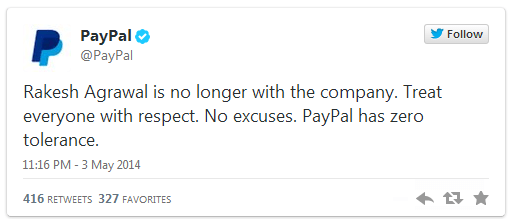
7 essential building blocks to manage corporate reputation online
“I don’t care about my bad reputation,” Joan Jett once sang. While we can appreciate the liberating power of not caring about the judgment of others, this is an attitude that corporations do not have the luxury of embracing. In a world where markets, technology, and the news cycle move faster than ever, your corporate reputation may be your most valuable intangible asset.
Share values plunge, product rollouts go poorly, and negative stories may surface and spread. Companies that can ride out events like these are often able to do so because their past actions established a track record of dependability, responsibility, and ongoing improvement. Companies with a bad reputation may suffer revenue and stock value losses for a long time after such events—just ask United Airlines or Wells Fargo.
Corporate reputation matters to all stakeholders: investors, employees, customers, and the industry at large. It’s vital to cultivate, but many businesses struggle to develop a cohesive vision and strategy for managing their corporate reputation.
A company’s reputation is based on many factors. Ethics, leadership, financial performance, product quality, customer service, and environmental stewardship are just a few of the factors considered. Every individual stakeholder will weigh each of those factors differently.
Corporate reputation or online reputation?
One important thing to note before going any further is the difference between managing a corporate reputation and Online Reputation Management (ORM).
The primary function of ORM is to lessen the impact of negative online content about a business, such as bad reviews, social media callouts, and viral videos that depict the company in a bad light. This is done by crowding out the negative content with positive content appearing in the same searches, hashtags, and news feeds as the negative stuff.
A corporate reputation management strategy needs to be proactive, not just reactive. It’s about building credibility and positive regard before you have a viral Twitter mess to clean up. In other words, corporate reputation management isn’t just damage control or public relations. It has to be considered more holistically.
Why corporate reputation really matters
Maintaining a strong corporate reputation isn’t just about building up enough cumulative goodwill to shake off bad publicity or an underwhelming quarterly financial report.
Companies have much more leverage and flexibility to define and meet their goals when their key stakeholders are all on the same page. You want to see a positive, confident outlook toward the company from customers, shareholders, and employees, as well as stakeholders outside the company, such as suppliers, influencers, and industry leaders.
You want people to want to work with you and to stick with you. Associating with your company, whether as an employee, a contractor, or a customer, should carry positive connotations.
When you’ve done the work to build the reputation you want, you can not only mitigate the impact when your company is going through bad times but also maximize the opportunities for growth you have during the good times.
Recommended for further reading
The battlefield for your reputation is online
Today, most of the work related to establishing and maintaining a positive corporate reputation is happening in general and on social media. Even when your company is engaged in good corporate citizenship in the real world, acting with integrity, and giving back to the community, it won’t count for much until people start talking about it on the internet.
With that in mind, many of the best practices for ORM are applicable to corporate reputation management. They just need to be part of a sustained, ongoing process.
Building a good reputation is a complex, lengthy process. There’s no formula or out-of-the-box solution for it. This leaves some companies believing that reputation is too vague and unquantifiable a concept to bother investing resources in, and that’s a mistake.

There’s no magic bullet, but there are concrete steps you can take to lay down the essential foundations of a good corporate reputation.
7 steps to managing corporate reputation online
Here are 7 key areas to address to keep your company’s name and reputation in good graces.
1. Keep your ear to the ground
The first and most important rule of reputation management is that you have to know what people are saying about you. If there’s a conversation about your company happening somewhere on the public internet, you should at least be aware that it’s happening — and whether anything is being said that merits a response.
It’s not enough to periodically search Google and social media for mentions of your name. Forums, Discord chats, Facebook groups, and other special-interest sites dedicated to your business, products, or industry should also be on your radar.
2. Engage respectfully
When misinformation or criticism comes up that you feel you should address, keep in mind that while ignoring the issue will do nothing to help your reputation, an ill-considered response can make things worse.
Don’t come across as defensive or attack your customers or employees. You can afford to push back harder against disinterested parties or competitors, but you still want to be measured and polite. If you’re not confident in your ability to strike the right tone when answering an important critique, you might want to look into consulting with a public relations firm.
That being said, knowing your audience, you can allow yourself to be endy and cheeky, and who knows, maybe even gain a bit of virality on the way. Check out O2’s Twitter feed for inspiration:

3. Practice transparency
Every company makes mistakes. Some companies, when confronted with an embarrassing public error, will circle up, throttle communications, and refuse to admit any wrongdoing. Other companies will lay it all out on the table: what went wrong, how it happened, and what they plan to do about it now and in the future.
Guess which company is making their problems worse instead of better?
Transparency builds trust, one of the required ingredients in a good reputation. Foster a culture of openness with your customers, workers, and community.
4. Get Google on your side
If a website made by a disgruntled customer is one of the first things that comes up when somebody Googles your company name, you’ve got a problem. All the carefully worded statements, transparency, and community outreach efforts you make will have a significantly reduced impact.
Maintaining a good reputation means getting up to your elbows in SEO and creating content that is relevant and quality enough to keep it high in the search rankings. This will push down all the negative links you’d rather people didn’t see.
For example, Hola VPN had to completely rebrand (to Luminati) partly because they could not live down the impact of bad product reviews that rank high on Google for highly related search queries:

5. Don’t shoot the messenger, just fix your problems
The kind of people who create viral content about corporate missteps aren’t always kind, civil, or safe-for-work in how they phrase and present their criticisms. If you’re on the receiving end of it, it’s easy for the message to get lost in the emotions elicited by an excessively blunt or hostile approach.
Nevertheless, the message matters. When someone raises valid concerns or points out problematic actions that don’t reflect your company’s values, it doesn’t matter if they’re rude or profane. Look to the heart of the issue, and if it’s something that your company could do better, then do better.
6. Take care of your people
Addressing criticisms and touting your good works can’t always come from top-down communications from the C-suite or official corporate statements. People are naturally skeptical of messaging that comes from executives, owners, and faceless press releases.
At some point, the growth of your good reputation will hit a wall if there isn’t any organic positive discussion about your company entering the discourse.
For that reason, it’s extremely important to treat your people well — your current employees as well as your past and potential future ones. What they say about you, in public online as well as in private conversations, will carry weight. People can spot the difference between genuine enthusiasm and forced corporate loyalty.
Give the people best positioned to talk up your company a reason to be enthusiastically positive.
7. Do good things!
Don’t forget to do good things just because they’re good! In addition to taking care of your workers, producing high-quality products, and providing excellent customer service, it means caring for and caring for the environment and neighborhood your business calls home. It may mean taking an active role in constructive charitable work in your community and the world at large.
This isn’t about planting urban gardens so you can tweet about them five minutes later and measure positive impressions. It’s about making sure that your good reputation isn’t just a façade that’s going to fall over under the slightest pressure.
Conclusion
Being a good corporate citizen and maintaining a positive reputation can be very challenging these days for various reasons. Working on these seven building blocks should give you a workable starting point for shaping the public perception of your enterprise into what you want it to be. With a conscientious approach to managing your corporate reputation, you can keep the word on your company positively focused.


